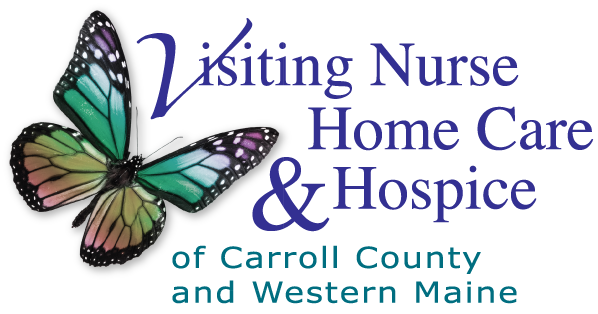Protecting the Homebound from COVID-19
March 26, 2021
)
Visiting Nurse Home Care and Hospice Starts Vaccine Outreach to Home Care Patients
NORTH CONWAY, NH — Visiting Nurse Home Care & Hospice of Carroll County and Western Maine (VNHCH) has a mission to enable independent living and to keep seniors in their homes as long as possible. That’s why they recently started a COVID-19 vaccination program to reach their home care patients who might otherwise find it difficult to make it to a vaccine clinic. Earlier this month, VNHCH assembled a COVID vaccine response team for the homebound, taking a lead role in coordinating this effort in cooperation with other state and local resources.
Executive Director Sandy Ruka, RN, stated that VNHCH met recently with NH’s Department of Health and Human Services (NHDHHS) and The Home Care, Hospice & Palliative Care Alliance of New Hampshire to strategize how best to serve these vulnerable homebound individuals. “We wanted to be certain that these elders in our community were accommodated and not overlooked between state and regional public health networks. NHDHHS Commissioner Lori Shibinette asked state home care agencies to contact patients to determine who required services and compile a list of those in need.”
VNHCH’s Covid Vaccine Response Team, made up of Ashlee Chaine, Jennifer Robinson, Anita Duncan, Lindsey Kafka and Sandy Ruka, acted promptly to take advantage of the state’s imperative to vaccinate homebound seniors.
Ruka explained the process as being complicated. “it’s not like a flu shot. It requires entering patient information into VAMS (the CDC’s vaccine registration portal). With the help of our volunteers, we called over 200 of our patients last week to determine if they were homebound and required a vaccine. We are also more than happy to vaccinate homebound people who are not current clients. There is a ‘homebound’ option for callers to the 211 vaccine hotline. We will then be able to use this list to identify our patients and others in the community that we can make arrangements to go out and vaccinate.” Teaming up with the nurses, Ashlee Chaine and Jennifer Robinson handle the technical pieces to lessen the burden on the nurses. After each vaccine dose, they’ll be in touch the following day to ensure they can address any vaccine side effects.
It’s not just scheduling logistics that are challenging – the handling of the vaccine itself is time-consuming and precise. Ruka continued, “Once we open that vial, we have six hours to get out and administer doses. We have to think through where we need to drive, how many nurses are available, and how many doses. Our service area is large and we may need to travel far. Depending on these logistics, we may only be able to do no more than a few patients a day. Adding to the time crunch is the 15-30 minute observation period required after administering the vaccine.”
The VNHCH team has quickly become experts in the proper handling of the vaccines, which require exacting protocols for temperature controls. For instance, vaccines can be stored in a refrigerator, but not one with a freezer. Another technique is to use a “conditioned” water bottle that is frozen, then partially melted so there is still ice in the center of it. The conditioned water bottle keeps it cold but not too cold. The VNHCH staff transports the vaccines with these bottles in a cooler along with digital data loggers. These devices use a probe that sits inside the cooler, placed in a liquid that mimics the temperature of the vaccine. Ruka said, “Our nurses monitor the data reader outside cooler the whole time they are traveling. It’s amazing.”
The homebound vaccination program will offer whichever vaccine is available at the time and supplied by the state, be it Moderna, Pfizer, or Johnson & Johnson. The CDC recommends that people take whatever vaccine is available to them. VNHCH will not know which vaccine they will be receiving but are prepared to administer any type of vaccine. The nurses will also be carrying any needed medications to promptly treat any unexpected adverse reactions using the same emergency protocols that all vaccine sites have available.
Ruka shared that their efforts could not happen without the support and collaboration of regional and local organizations, including Carroll County’s NH Public Health Emergency Preparedness Coordinator Victoria Paige, and Will Owen, Emergency Preparedness Coordinator at Memorial Hospital. Additionally, Memorial is allowing VNHCH to store vaccines in their pharmacy refrigeration due to its complexity and sensitivity. “I give full credit to Memorial Hospital – they are doing a great job in this COVID vaccine movement and in making this a true community effort.”
How to Request a COVID-19 Vaccine for the Homebound
If you are a current client, VNHCH will call you to make arrangements. Initial calls have already taken place, but now the agency will be calling to schedule specific dates by the individual.
Those who are not already a current client of VNHCH can also take part. Just call 211 and ask for the “Homebound Program.” They will coordinate with VNHCH to coordinate scheduling.
VNHCH can also vaccinate caregivers of these homebound clients ages 50 and up as of March 25.
———————————————
For more information on Visiting Nurse Home Care and Hospice, contact them at 603-356-7006 or visit them online at www.vnhch.org.
